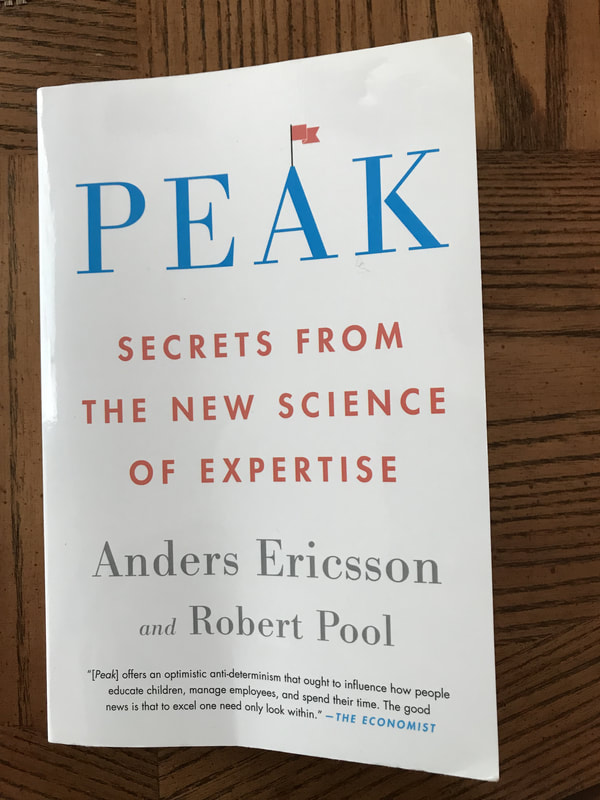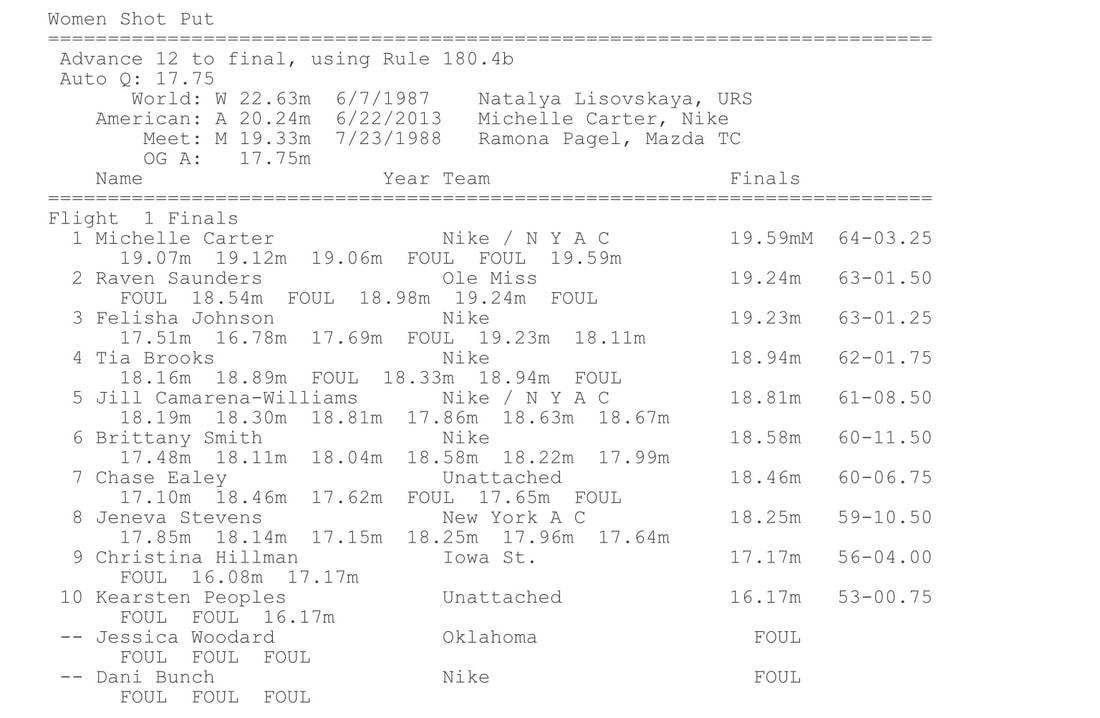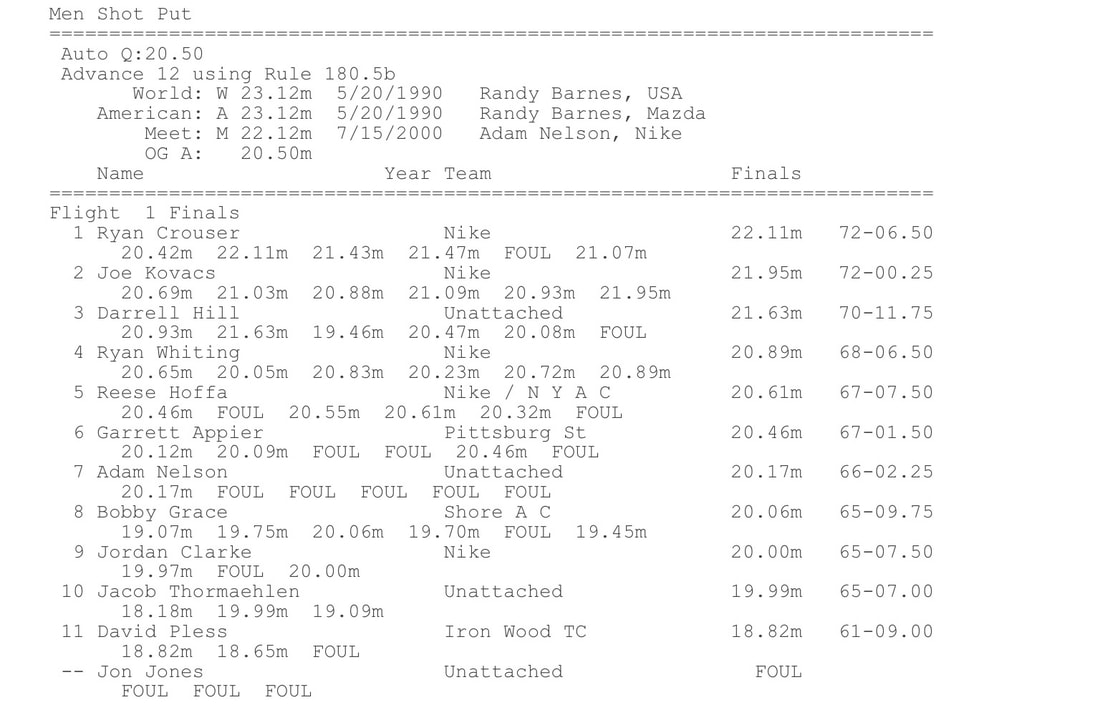|
For the third time in the past couple of months I finished the book titled Peak: Secrets From the New Science of Expertise, by Anders Ericsson and Robert Pool. Dr. Ericsson is the world’s foremost leading researcher on the topic of expertise. He has dedicated his career on learning more about mastering such fields as number memorization, classical pianists, and classical violinists. More specifically, he often asks how long it takes to reach a specific specialization or level of expertise on the particular field. He is based out of Florida State University. After finishing his book this most recent time, it got me thinking about expertise in throwing. More specifically, do throwers that qualify for the Olympic Games, on average, spend more time training and throwing than their peers who do not qualify for the Olympic Games (specific to throwers in the United States only)? I’ve been thinking about it for a few days, and I think it is an interesting question. Similar to the question I posted above, a very prominent and successful throwing coach recently wrote an article for Track Coach, the journal released by USATF. In his article, Coach Babbitt discussed the notion that the United States has not had recent success in producing Olympic medalist caliber Javelin throwers. We have many American male javelin throwers consistently throwing over 70m (230’), however we have had very limited success in the World Championships and Olympic Games. One of his suggestions to possibly alleviate the United States of their male javelin throwing drought is to keep successful coach-dyads together in the hopes of building upon their collegiate success. Allow them to attend camps and clinics together. Provide them the opportunity to learn and grow together, as a team, rather than only provide resources to the thrower without aiding their coach. Allow them the time to train together, quality training time that is deliberate in nature. That recap may be a little off tangent, but it does beg the question: Do American Olympic Qualifiers spend more time training (hours) on average, than their peers who do not qualify for the Olympic Games? The United States has a rich history of successful male and female shot-putters. Two throwers, Michelle Carter and Ryan Crouser, have recently won World Championships and Olympic Gold Medals in the shot-put. They both come from throwing families. I remember reading about Michelle when she was in high-school, regarded as the future of the women’s shot-put. Similar to Ryan, coming from a family of throwers, he had a great collegiate career before turning professional. I’m willing to take a guess that they, on average, spent more time training than their peers. They had hundreds and thousands of hours of specific throwing training before entering college, and they both achieved great success as collegiate throwers. They are unique, probably not the norm. Michelle’s dad has an Olympic Silver medal in the men’s shot put, and still holds the men’s high school record, having thrown over 80’. For our other American Olympians, have they accumulated the same amount of deliberate practice that Michelle and Ryan have accounted for? I asked an American Olympian this very question-how much time did you spend training before qualifying for your first Olympic games. The response I received was about 2000 hours. The thrower I asked had graduated from college, and the 2000 hours represented two years leading up to his first Olympic games (not taking into consideration his previous collegiate training hours). Breaking it down even more, that is about 1000 hours a year, or roughly 20 hours per week of training (throwing and weightlifting). I’ll get back to this example later. Let’s bring it back to the 2016 Olympic Trials competition. My question is, leading up to the Olympic Trials (let’s say the four previous years), did Michelle, Raven, and Felisha have, on average, more practice hours than their peers that did not finish in the top 3? Getting back to Anders’ study of time spent playing the violin, his study of German violinist found that the students considered to be at the top of their class (having the best potential to earn a chair on a prestigious orchestra) had on average, spent more time practicing their craft than their peers that were considered to not have as great a chance to earn a prestigious spot on an orchestra in Germany. Some students reported having spent up to 8000 hours practicing the violin before they turned 20. Results from the 2016 Olympic Trials-Women's Shot-Put (www.usatf.org) Results from the Men's 2016 Olympic Trials-Shot-Put (www.usatf.org) Now, with our American female shot-putters, I wonder if the same would be said for our three Olympic qualifiers? Obviously training for the shot-put is much more physically taxing on the body, and I wouldn’t think that in the four years leading up to this Olympic Trials that any of our top three women practiced/trained, on average, over 2000 hours. However, I wonder if their average was more than the other competitors?
Similarly, can the same be said for the American male shot-putters? If you look at the finals list, you will see two previous World Champions and Olympic Gold Medalist in the shot-put (Adam Nelson and Reese Hoffa). I’m pretty sure they have accumulated the most training time combined than everyone else on the list’s time put together. Adam and Reese have been on the American throwing scene since 2000, and pretty much made every American male shot-put team that competed in the World Championships and Olympic Games since 2000. When I talk about accumulated training time, I’m referring to time spent really focusing on a specific aspect of throwing and training. The real mundane activities that need to be done in order to put yourself in the best possible position to succeed. A second thrower I asked told me that he spent 14 hours a week focused on throwing and weightlifting. He qualified for the Olympic Games. I’m not saying that anyone who spends XXX amount of time training will automatically become an Olympic thrower. That isn’t the point of the article. It has to be deliberate. It has to be focused upon, not just for the sake of doing it. Your focus has to be deliberate. You need to receive feedback, make changes, adapt, and receive feedback again. Angela Duckworth discussed this in her book Grit. For American throwers however, is there a threshold that gives someone a better opportunity at qualifying for an Olympic Games? In the case of the shot-put, it makes sense that American throwers have accumulated a lot of training time, since the shot-put is contested at pretty much every high school in the country beginning in middle school. The same can be said for the discus, yet we have not had as much recent success in American discus throwing as we have had in American shot-putting. Equal time, therefore, in this case, does not equate to success at the international level. If not time, then what?
0 Comments
Leave a Reply. |
Dr. Charles InfurnaCharles Infurna, Ed.D., is the owner and lead coach of Forza Athletics Track Club. Dr. Infurna has coached National Record Holders, National Champions, All-Americans, and Conference Champions at the Post-Collegiate, Collegiate, and High School level. Archives
January 2023
Categories |




 RSS Feed
RSS Feed